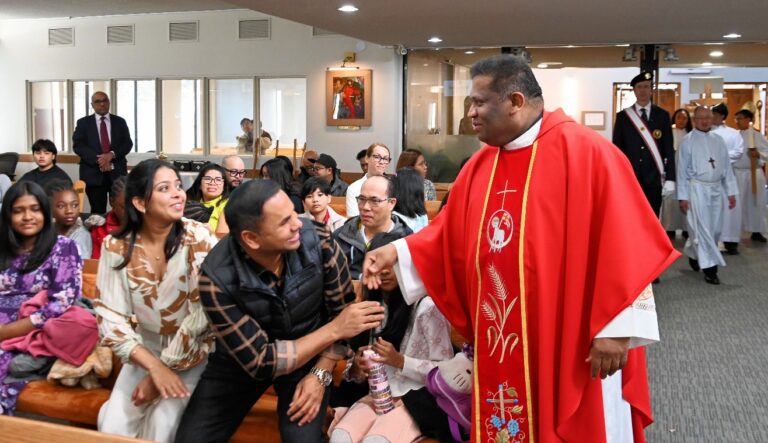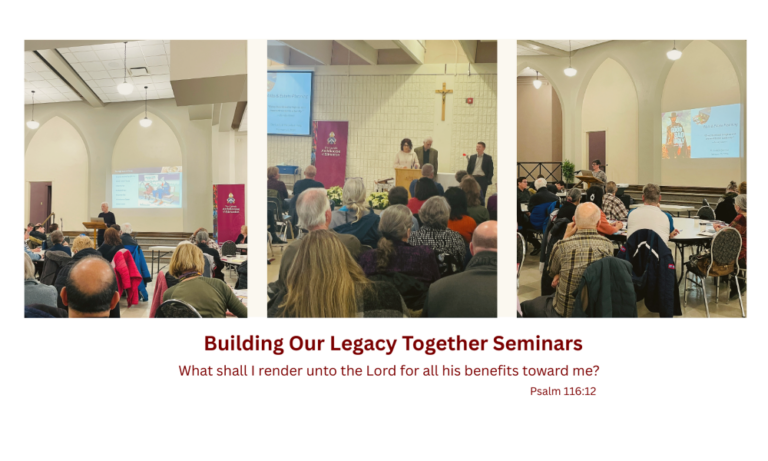Many years ago, as a junior high student, I discovered a love for performing in the theatre. The high point of my acting career took place when I was 16 years old, and I was given the opportunity to play the part of the lame man healed by Jesus (John 5) in an Easter musical entitled Love According to John. It was an extraordinary experience I don\’t think I\’ll ever forget. The performance took place on the big stage where I’d previously seen Phantom of the Opera and Joseph and the Amazing Technicolor Dreamcoat. But we’d prepared for months to get there – learning the songs, learning our lines, the blocking, and rehearsing, rehearsing, rehearsing.
When I was just getting started in youth ministry, one of my instructors referenced the stage to help me understand the Catechism of the Catholic Church. He showed how the four main sections of the Catechism can be understood in much the same way as someone learns their part in a stage play. These four sections are based on what we read of the early Church in Acts 2:42, when early Christians “…devoted themselves to the apostles\’ teaching and fellowship, to the breaking of bread and the prayers”.
The four pillars of the Catechism are these very things: the Apostles\’ teaching (Section 1: The Creed), the Breaking of the Bread (Section 2: The Sacraments), Fellowship (Section 3: The Moral life) and Prayer (Section 4). From a theatre perspective, the Creed summarizes the great story God has been unfolding since before the beginning of time and the Sacraments represent our opportunity to step in and be a part of this unfolding drama. The Moral Life is our script, which helps us understand what we are expected to do as we play our part in the story; and Prayer is our relationship with God, who is at the same time creator, director, and producer.
Alongside a well-read copy of the Bible, the Catechism of the Catholic Church is a book that should be on every Catholic’s shelf. And it should be our first stop when we have questions about the faith (before we turn to Google). Knowing our way around the Catechism can help us when we have questions about the faith, or when we are challenged by others on what the Church teaches and believes.
The full CCC can seem a bit dense to read. This is why over the years, many have written summaries of the Catechism to make it easier to understand. Two of these have been official Church publications: the Compendium of the Catechism of the Catholic Church (published in 2006), offering 598 questions and answers in the same four sections in which the CCC was written. Later, in preparation for World Youth Day 2011 in Madrid, the Church published the YouCat (the Youth Catechism) to help make the teachings of the Church more accessible to young people. YouCat is written on the same four pillars as the full Catechism, and includes a beautiful introduction (and challenge) from Pope Benedict XVI (who had been a key figure in the development of the full Catechism):
I invite you: Study this Catechism! That is my heartfelt desire.
This Catechism was not written to please you. It will not make life easy for you, because it demands of you a new life. It places before you the Gospel message as the “pearl of great value” (Mt 13:46) for which you must give everything. So I beg you: Study this Catechism with passion and perseverance. Make a sacrifice of your time for it! Study it in the quiet of your room; read it with a friend; form study groups and networks; share with each other on the Internet. By all means continue to talk with each other about your faith.
You need to know what you believe. You need to know your faith with that same precision with which an IT specialist knows the inner workings of a computer. You need to understand it like a good musician knows the piece he is playing. Yes, you need to be more deeply rooted in the faith than the generation of your parents so that you can engage the challenges and temptations of this time with strength and determination. You need God’s help if your faith is not going to dry up like a dewdrop in the sun, if you want to resist the blandishments of consumerism, if your love is not to drown in pornography, if you are not going to betray the weak and leave the vulnerable helpless.
Ten years ago, I took advantage of this great resource and put together a series of posts going through the main topics found in the index of YouCat for further reflection. Over the course of 2022-23, I\’m going to share my reflections on these topics as a series for the Window e-newsletter. I pray that, as we reflect on what we believe and do, you can discover the story God has been unfolding since before the beginning of time, the ways that you can enter into the story, the role you are called to play, and, ultimately, your relationship with the God who is the origin and goal of all we believe and do.
-Mike Landry is Catholic Youth Camps director for the Archdiocese of Edmonton. He is also chaplain for Evergreen Catholic Schools, serving 10 schools west of Edmonton. Mike and his wife Jennifer live in Stony Plain with their five children.




